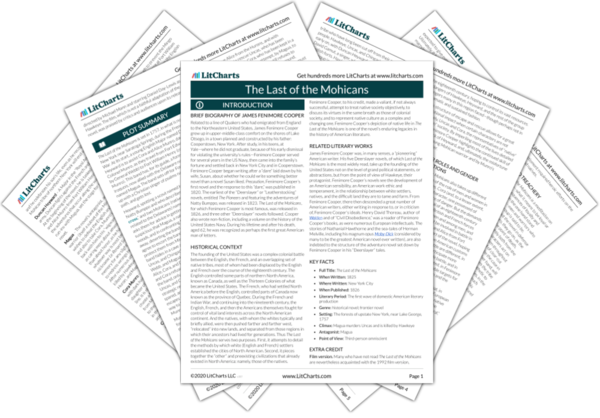Summary
Analysis
Hawkeye walks back to the Huron village, and finds David in his own, small hut, which the Huron permit him to live in, separate from the rest of the villagers. Hawkeye, who is still dressed in his bear costume, addresses David, and asks if David can take Hawkeye to where Uncas is being held. David, is at first scared of the bear, but then recognizes Hawkeye and says that he will be able to set up a private meeting between Hawkeye and Uncas.
David, once again, proves immensely useful to the band, as they attempt here to save Uncas and continue their fight against Magua. David understands that his status as a non-combatant will allow him to spy on the Hurons—the kind of activity his religious studies probably forbade, but one that is a great help in the forest.
Themes
David walks with Hawkeye to the lodge of the chiefs in the village, and says that he, David, wishes to take this “conjuror” (Hawkeye) to Uncas, in order to humiliate Uncas for his capture—a form of shaming common in Huron and Delaware cultures. David tells the Huron warriors that they will not be able to come with them, as David does not want Uncas’s “womanliness” to taint the Hurons. The Hurons grant Hawkeye and David access to Uncas.
David has become so adept in the ways of the natives, he understands that this shaming ritual, in which Uncas would be compared to a woman and a bad warrior, would be a very persuasive one for the Hurons. It is hard to imagine the pursuit of Magua being so successful without David’s assistance.
Themes
Hawkeye enters Uncas’s small prison-hut while David guards the entrance. Hawkeye dances for a moment in the bear costume, but Uncas, recognizing immediately that it is only a man in a bear suit, asks who has come for him. Hawkeye announces himself, and tells David, quickly, to help him untie the bands shackling Uncas to the prison-hut walls. Hawkeye tells Uncas that he can go ahead, leaving Hawkeye and David to escape the Huron village together, but Uncas says he will not abandon “his father’s brother,” and Hawkeye, cheered by this news, has Uncas put on the bear costume, and David put on Hawkeye’s scout garments, since, as Hawkeye puts it, David will have need of Hawkeye’s tools and weapons in the forest. Hawkeye then puts on David’s clothes, and pretends to be the singer.
Just as Hawkeye went back into the Huron village to rescue Uncas, so now is Uncas unwilling to let Hawkeye fend for himself, in the escape from that same village. This scene tells the reader a great deal about native custom: in essence, the nature of honor in the native societies depicted in the novel is one of reciprocal help and mutual respect. Uncas and Hawkeye are willing to help one another, because each knows that the other would do the same. This allows Uncas, Hawkeye, and Chingachgook to fight armies of far greater size and strength—because they function so effectively as a fighting unit.
Themes
David stays behind in the Huron village, creating a diversion by yelling in Uncas’s prison hut, to allow Hawkeye and Uncas to escape. Hawkeye, singing loudly and pretending to be David, walks with Uncas (still in the bear suit) to the edge of the village, and safely; David screams in the center of the village, drawing Huron warriors away from Hawkeye and Uncas; and the two proceed deeper into the forest, toward the Delaware village, with the idea that David will meet them there soon, after escaping his Huron captors—Hawkeye bets that the Hurons will not attack or imprison David because they believe him insane and a “non-compassor,” or a non-combatant.
For much of the novel, David did not understand that his singing would be considered a distraction to those around him, especially to natives—David simply thought he was singing God’s word, and doing God’s work among the “heathens.” But now, just as David understands that he can act as a spy and help the cause of the band, here he can use his music for the purposes of distraction, not for religious instruction.
Themes
Get the entire The Last of the Mohicans LitChart as a printable PDF.













